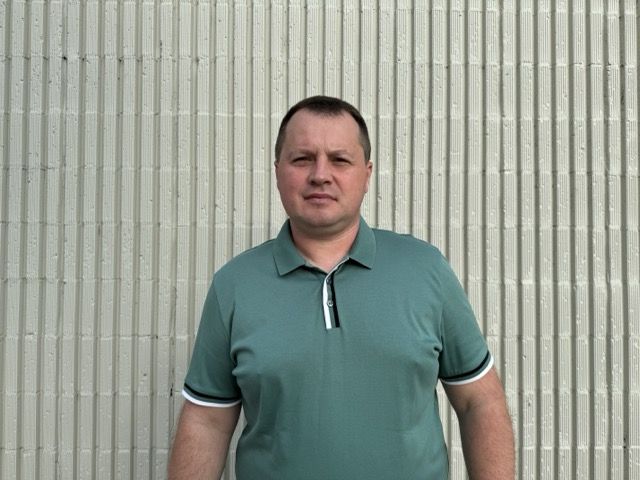Written by Volha Hurskaya
The global trend of Ready-To-Eat Meals (RTE Meals) is gaining momentum, with a steady growth observed in the global market for long-term storage, ready-made meals. This trend aligns several important aspects: the demand for healthy eating, convenience, and quick preparation, especially given the fast pace of life and the prevalence of eating outside the home. A specific segment of this market is food designed for difficult conditions and hard-to-reach areas where full hot meal preparation isn't possible.
In this context, a new unique technology has been developed by Ukrainian businessman Yevhenii Shevchenko: a method of preparing sterilized ready meals packaged in soft food-grade retort pouches with a long shelf life. He told us how his idea addresses the challenges faced by modern society and solves current food security issues.
"The number of places where organizing full-fledged meals is difficult has multiplied."
— Yevhenii, the global Ready-To-Eat Meals (RTE) market is growing rapidly. How did you manage to carve out your niche in this trend?
— Finding a unique place in the market usually comes from precisely identifying your potential consumer. In my case, it was the result of years of diverse interactions across different environments. Over time, I met many people who, due to professional or life circumstances, lacked access to proper meals. Today, this is especially relevant—the number of places where organizing full-fledged meals is difficult has multiplied.
— Your invention isn’t just an idea but the result of years of experience. How did you develop your innovative concept and technology?
— My entire career has been in public catering—working in budget, social, and commercial institutions. It’s a family tradition; my family has been involved in food provision for decades. After earning a degree in International Economic Relations, I decided to develop this field further. Then, after years at state-owned enterprises, I founded my own company in 2014 and began developing a new technology—sterilizing and packaging ready-made meals in soft retort pouches with extended shelf life. By the way, I coined the term "retort pouches" myself.
"Quality control is the most vulnerable point."
— You were the first to implement HACCP certification in Ukraine, even before it became mandatory. How did you achieve that?
— Yes, we adopted HACCP standards early because we understood that quality and safety were critical. Typically, quality control is the most vulnerable point when it comes to ready-made and long-term storage meals. That’s why I consider my sterilization and retort packaging technology a breakthrough—it’s a universal solution to the problem. At the time, Dnipro and the Dnipropetrovsk region became our testing ground, where we refined all processes. A full logistics modernization and strict quality control allowed us to meet global standards.
— Your company supplies meals to schools, hospitals, the military, and police structures, including the National Police of Ukraine and the National Guard of Ukraine. How has your solution changed their diets?
— Our consumers span nearly all sectors—schools, educational and rehabilitation centers for children, psychiatric and neurological institutions for adults, orphanages, industrial enterprises—it’s hard to list them all. We identified this market using a simple principle: produce ready-made and long-term storage meals and deliver them where they’re needed most. Eventually, we established a full production cycle, freeing these institutions from procurement, cooking, and quality control issues. Our meals retain all vitamins and minerals, and most importantly, they can be quickly reheated even in field conditions.
"Special processing methods developed after years of testing."
— Since 2014, you’ve implemented unique resource-saving technologies, including your own production facility and a kitchen factory operating under proprietary technical conditions. Why did you consider this approach necessary?
— With my extensive experience and market analysis, I concluded that the most promising approach for modern Ukraine is catering based on a network of kitchen factories. This ensures 100% centralized cooking and delivery to public catering establishments, where meals are reheated and served while preserving all nutrients and maintaining high quality. Naturally, the next step was making these meals long-lasting, usable both cold and heated, and requiring no special storage conditions.
— Your sterilization and packaging technology is revolutionary. What makes it unique?
— We cook products in an autoclave under high pressure using special processing methods developed after years of testing. This required a new type of packaging, so we replaced traditional glass or tin cans with soft retort pouches that need no special storage conditions. Every component was rigorously tested and approved only after extensive experimentation and refinements in cooking and packaging techniques. As a result, meals stay fresh for up to 24 months without preservatives, keeping their natural taste and texture—no "mushy paste."
"The technology is adaptable to any country."
— You mentioned your product line includes national dishes. How did you adapt the technology to different tastes?
— We studied the market and expanded our range to include soups, porridges, meat, mushrooms, and vegetable dishes. Now, we’re developing fish, seafood, and vegetarian options. The technology allows for any recipe base, accounting for traditional preferences, so it’s applicable anywhere in the world.
— Your products are already used in extreme conditions. What feedback have you received?
— They’ve proven effective in remote areas, humanitarian missions, military use, and disaster response. For example, meals can be reheated without fire, using chemical heating elements or alternative energy sources. Our next step is to include these solutions in ready-to-use kits.
— Now, you’re entering the global market. What are your plans?
— We’ve studied European technologies and are now preparing to collaborate with the U.S. Our solution is universal—it can be tailored to any cuisine. I’m confident our long-term storage meals will soon become a global standard.
— Yevhenii, your project isn’t just a business but a socially significant initiative. What matters most to you in this work?
— What’s important is that people in any conditions have access to quality food. My goal is to change the approach to nutrition where it’s needed most. And judging by the results, we’re succeeding.














